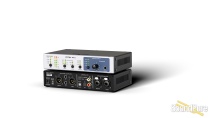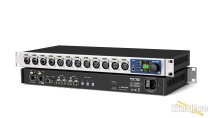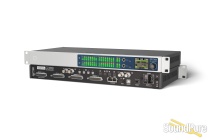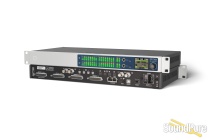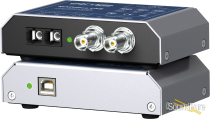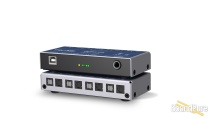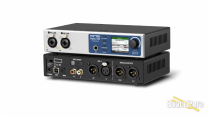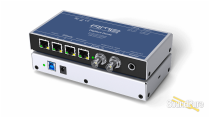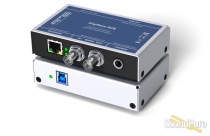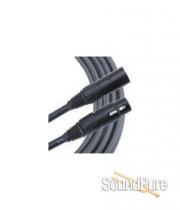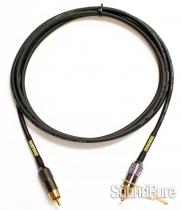Analog Inputs
XLR
• Input: XLR, servo-balanced • Input sensitivity switchable +24 dBu, +19 dBu, +13 dBu, +4 dBu @ 0 dBFS
• Signal to Noise ratio (SNR) @ +13/19/24 dBu: 120.x dB RMS unweighted, 124.x dBA
• Signal to Noise ratio (SNR) @ +4 dBu: 119 dB RMS unweighted, 123 dBA
• Frequency response @ 44.1 kHz, -0.1 dB: 5 Hz – 20.5 kHz
• Frequency response @ 96 kHz, -0.5 dB: 3 Hz – 45.5 kHz
• Frequency response @ 192 kHz, -1 dB: 2 Hz – 92.7 kHz
• Frequency response @ 384 kHz, -1 dB: < 1 Hz – 124 kHz
• Frequency response @ 768 kHz, -3 dB: < 1 Hz – 180 kHz
• THD @ -1 dBFS: -116 dB, 0.00016 %
• THD+N @ -1 dBFS: -112 dB, 0.00025 %
• Channel separation: > 110 dB
TRS
As input XLR, but:
• Input: 6.3 mm TRS jack, servo-balanced, fully compatible to TS and RCA
Analog Outputs
1/2 XLR
• Output level switchable +24 dBu, +19 dBu, +13 dBu, +4 dBu @ 0 dBFS
• Signal to Noise ratio (SNR) @ +13/19/24 dBu: 117 dB RMS unweighted, 120 dBA
• Signal to Noise ratio (SNR) @ +4 dBu: 115 dB RMS unweighted, 118 dBA
• Frequency response @ 44.1 kHz, -0.1 dB: 0 Hz – 20.2 kHz
• Frequency response @ 96 kHz, -0.5 dB: 0 Hz – 44.9 kHz
• Frequency response @ 192 kHz, -1 dB: 0 Hz – 88 kHz
• THD @ -1 dBFS: -112 dB, 0.00025 %
• THD+N @ -1 dBFS: -110 dB, 0.00032 %
• THD @ -3 dBFS: -116 dB, 0.00016 %
• Channel separation: > 110 dB
• Output impedance: 200 Ohm balanced, 100 Ohm unbalanced
1/2 TS (rear)
As output XLR, but:
• Output: 6.3 mm TS jack, unbalanced
• Maximum output level: +19 dBu
• Signal to Noise ratio (SNR) @ +13/19 dBu: 117 dB RMS unweighted, 120 dBA
• Signal to Noise ratio (SNR) @ +4 dBu: 113 dB RMS unweighted, 117 dBA
• Output impedance: 100 Ohm
Phones 1/2
As Output 1/2 TS, but:
• Output: 6.3 mm TRS jack, unbalanced, stereo
• Output impedance: 0.1 Ohm
• Signal to Noise ratio (SNR) @ +22 dBu: 117 dB RMS unweighted, 120 dBA
• Signal to Noise ratio (SNR) @ +7 dBu: 114 dB RMS unweighted, 118 dBA
• Output level at 0 dBFS, Ref Level +19 dBu, load 100 Ohm or up: +22 dBu (10 V)
• Output level at 0 dBFS, Ref Level +4 dBu, load 8 Ohm or up: +7 dBu (1.73 V)
• THD @ +18 dBu, 32 Ohm load, 1.2 Watt: -110 dB, 0.0003 %
• THD+N @ + 18 dBu, 32 Ohm load: -107 dB, 0.00045 %
• THD @ +14 dBu, 16 Ohm load, 0.94 Watt: -110 dB
Output Phones 3/4
As Output Phones 1/2, but:
• Output levels at 0 dBFS: Hi-Power off +7 dBu, Hi-Power On +22 dBu
Balanced Phones mode
As before, but:
• Output levels at 0 dBFS: Hi-Power off +13 dBu (9.8 V), Hi-Power On +28 dBu (19.5 V)
• Output impedance: 0.2 Ohm
• Signal to Noise ratio (SNR) @ +28 dBu: 120 dB RMS unweighted, 123 dBA
• Signal to Noise ratio (SNR) @ +13 dBu: 118.4 dB RMS unweighted, 122 dBA
• Output level at 0 dBFS, Hi-Power On, load 150 Ohm or up: +28 dBu (19.5 V)
• Output level at 0 dBFS, Hi-Power Off, load 8 Ohm or up: +13 dBu (9.8 V)
• Max power @ 0.001% THD: 2.9 W per channel
Digital Inputs
General
• Lock Range: 28 kHz – 200 kHz
• Jitter suppression: > 50 dB (2.4 kHz)
AES/EBU
• 1 x XLR, transformer-balanced, galvanically isolated, according to AES3-1992
• SPDIF compatible (IEC 60958)
SPDIF coaxial
• 1 x RCA, transformer-balanced, according to IEC 60958
• AES/EBU compatible (AES3-1992)
SPDIF optical
• 1 x optical, according to IEC 60958
• ADAT compatible
Digital Outputs
AES/EBU
• 1 x XLR, transformer-balanced, galvanically isolated, according to AES3-1992
• Single Wire mode, sample rate 44 kHz up to 192 kHz
SPDIF coaxial
• 1 x RCA, according to IEC 60958
• Single Wire mode, sample rate 44 kHz up to 192 kHz
SPDIF optical
• 1 x optical, according to IEC 60958
• Sample rate 44 kHz up to 192 kHz
Digital
• Clocks: Internal, AES In, SPDIF In, ADAT In
• Jitter suppression of external clocks: > 50 dB (2.4 kHz)
• Supported sample rates for external clocks: 32 kHz up to 192 kHz
• Internal Clocks: 44.1 kHz up to 768 kHz
General
• Included power supply: external switching PSU, 100 - 240 V AC, 2 A, 24 Watts
• Standby power consumption: 50 mW
• Idle power consumption: 10 Watts, Max. power consumption: 22 Watts
• Idle current at 12 V: 850 mA (10 Watts)
• Dimensions (WxHxD): 215 x 44 x 130 mm (8.5" x 1.73" x 5.1")






